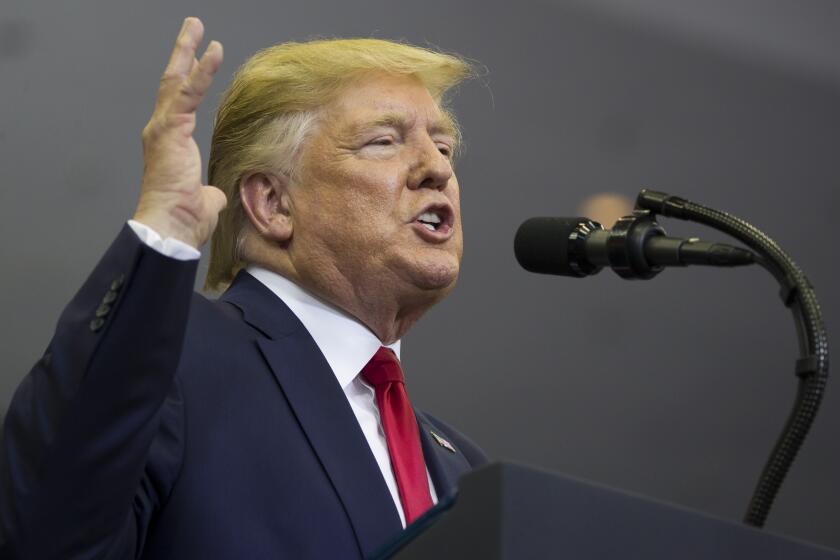Column: COVID lockdowns saved millions of lives — so of course Ron DeSantis is angry about them

Our political press, in its wisdom, has anointed Nikki Haley and Vivek Ramaswamy the “winners,” whatever that means, of last week’s Republican debate.
I have a different take. I thought the winner was Florida Gov. Ron DeSantis, for the simple reason that he was the only person on stage who actually articulated a policy statement. Unfortunately for the cause of intelligent discourse, his statement was erected upon a pediment of lies.
Not just ordinary lies, mind you. Lies that undergirded his administration’s gruesome failure in the fight against COVID-19.
Lockdown states locked their kids out of school for a year, year-and-a-half. That was wrong....I stood for our kids.
— Florida Gov. Ron DeSantis, at last week’s GOP debate
More on that in a moment. The most shocking aspect of the debate may have been how negligent our political press was at evaluating its content — or rather, the vacuousness of its content.
Instead, reporters and pundits became transfixed by Ramaswamy, who is nothing but an attention whore trying to sell an astoundingly baroque line of chatter. (He sure does know his audience in the press corps.)
Get the latest from Michael Hiltzik
Commentary on economics and more from a Pulitzer Prize winner.
You may occasionally receive promotional content from the Los Angeles Times.
As for Haley, her most consistent bite on social media is the notion that a vote for Biden is a vote for a President Kamala Harris. She never gets around to explaining what that means or why it would be bad.
She’s implying that Biden won’t live to the end of another term, but that merely glosses over the visible decrepitude of her own party’s leader, who is only three years younger than Biden and who oversaw an administration that is likely to go down as the most incompetent and corrupt in American history.
DeSantis’ hand-picked Disney World board claims that giving out employee discounts is ‘unethical.’ But it’s a nonsense argument made by an entity with ethics problems of its own.
Back to DeSantis. Here’s what he said during the debate Wednesday night about COVID lockdowns. “It was a mistake. It should have never happened. And in Florida, we led the country out of lockdown. We kept our state free and open. And I can tell you this. As your president, I will never let the deep state bureaucrats lock you down.”
There’s a lot there to unpack, but let’s start with the most fundamental point: In the early months of the COVID pandemic, before vaccines became widely available, lockdowns worked.
Combined with other “non-pharmaceutical interventions” (NPIs) such as masking and social distancing, they slowed the spread of the disease, saving millions of people from falling ill, landing in the hospital, or dying. Absent these measures, hospitals, which already were overrun with patients in dire condition, would have fared even worse.
Studies from as early as mid-2021 validated those findings. The latest evidence comes from the Royal Society, Britain’s 360-year-old academy of sciences, known for its painstaking, objective research. (Its motto “nullius in verba” translates as “take nobody’s word for it.”)
A report the society released this month studied the effect of NPIs in Hong Kong, New Zealand and South Korea during the first 18 months of the pandemic. The evidence shows “unequivocally” that lockdowns and the other social approaches “can provide powerful, effective and prolonged reductions in viral transmission,” the report states.
The report added that these steps are most effective if undertaken when disease transmission is low, such as “during the emergence of a pandemic and at the earliest signs of resurgence of infection.”
During the debate, DeSantis also bragged about opening Florida’s schools during the pandemic. Referring to a nationwide decline in K-12 test scores in the aftermath of the pandemic, he said, “A lot of the problems that we’ve seen are because these lockdown states locked their kids out of school for a year, year-and-a-half. That was wrong.... I stood for our kids.”
They were some of the most prominent academics in the country. They pushed a devastatingly wrong COVID policy, but they’ve never admitted their error.
A couple of things about that. DeSantis was as quick as other governors, Democrats and Republicans, to shut down his state’s schools at the start of the pandemic; he ordered them closed on April 18, 2020, for the rest of the school year.
DeSantis ordered the schools reopened earlier than many other states, at the start of the 2020-21 school year, however. He also forbade schools to require masks, and even threatened to withhold pay and state funding from officials and districts that bucked his orders.
How did that go? COVID cases among Florida children spiked, tripling compared with the pre-reopening period. Overall, Florida ranks 19th among the states in cumulative COVID cases per 100,000 children. (Its record is probably significantly worse, since its figures cover only children up to 14 and most other states’ count kids up to age 19.)
The idea that it was virtuous to reopen schools in the heat of the pandemic is based on a concatenation of myths beloved by conservative politicians that, unfortunately, have seeped into the public debate about pandemic countermeasures across the partisan spectrum.
There’s the myth that school closings and the shift to remote teaching was almost entirely responsible for the decline in test scores. The evidence for that is murky at best. It’s contradicted, for example, by comparing the Florida experience with that of California, where most districts weren’t cleared to reopen until April 2021.
As I reported in October, when 2022 national test scores were released, Florida’s kids lost more ground in reading and math than California’s.
Several factors other than school closings may have accounted for the achievement decline during the pandemic. One is the general social disruption caused by the pandemic, which schoolchildren surely felt almost as acutely as their parents.
“Disruption” is too mild a word for what many children faced. About 360,000 American children lost a primary or secondary caregiver to COVID. Nearly 300,000 were orphaned by the loss of one or both parents.
Florida has ranked third among states in the absolute number of children who lost a primary or secondary caregiver, after California and Texas. But in per capita losses it leads the roll, at 596 per 100,000 children, compared with 554 in Texas and 501 in California.
Who brought COVID into these households? In a shocking number of cases, it was children. According to a peer-reviewed study published in June of about 39,000 COVID cases in 166,000 U.S. households, more than 70% began with a child bringing the virus into the home and infecting siblings or adults.
Importantly, the transmission rate fell during school breaks — underscoring the role of K-12 classrooms in spreading the virus.
Taking aim at Ron DeSantis, his rival for the Republican presidential nomination, Donald Trump scored direct hits on the pandemic and education.
In other words, the researchers wrote, “children were important viral vectors in households during the pandemic, particularly when school was in session.”
One other myth perpetuated by DeSantis and his fellow GOP political leaders is that children were largely immune to COVID and that even if they contracted the disease, their symptoms were mild or nonexistent.
Yet according to figures from the Centers for Disease Control and Prevention, more than 2,300 children have died from COVID. Is that a lot or a little? To their families, it’s devastating. It should be shocking to everyone. Then-CDC Director Rochelle Walensky found herself obligated to explain the facts of life to a GOP congressman at a hearing in August 2021, informing him that “children are not supposed to die.”
The problem with the argument that closing schools was a mistake is the failure to ask: “Compared to what?”
As New York neurologist and psychiatrist Jonathan Howard has put it: “What would have happened had schools remained open without any mitigation measures?” The obvious answer, he has written, “is that nearly all children would have gotten COVID, as would everyone they live with, and most school employees.”
As we’ve reported in the past, DeSantis’ record on COVID is nothing short of tragic. As of May, Florida’s COVID death rate of 411 per 100,000 population was 10th worst in the nation — about 88,000 residents ; California, with a rate of 259.4, ranks 42nd. If Florida had California’s death rate, about 32,000 Floridians would have been spared.
DeSantis’ sycophants argue that Florida’s COVID death rate is an artifact of its demographics, since it has a high percentage of seniors, who are notably vulnerable to the disease. That won’t wash.
Vermont, New Hampshire and Maine, which have higher percentages of residents 65 and older, have much lower COVID death rates. In any case, DeSantis always claimed that his pandemic approach was focused on protecting those most vulnerable seniors. If so, he failed miserably at that task.
At the debate, however, he did do his best to hold the viewers’ attention. Most of the other seven candidates on the stage did too. If you tuned in to hear substance, you came to the wrong place.
More to Read
Get the latest from Michael Hiltzik
Commentary on economics and more from a Pulitzer Prize winner.
You may occasionally receive promotional content from the Los Angeles Times.













